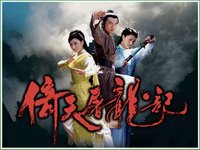 Cerita Silat is a martial art story about Chinese Martial arts warriors. These stories are adapted to Chinese history before, around, and after the Ming dynasty. They are stories about Chinese rebellious patriots who fought for freedom from the Manchu’s occupation of China, and stories about warriors who defended the poor against landlords, the oppressive rich, powerful Lords, corrupt eunuchs and incompetent Emperors.
Cerita Silat is a martial art story about Chinese Martial arts warriors. These stories are adapted to Chinese history before, around, and after the Ming dynasty. They are stories about Chinese rebellious patriots who fought for freedom from the Manchu’s occupation of China, and stories about warriors who defended the poor against landlords, the oppressive rich, powerful Lords, corrupt eunuchs and incompetent Emperors.Many of these stories originated from mainland China, Hongkong and Taiwan and translated into Indonesian by famous writers including the first generation writer Tan Tek Ho (or aka Kwo Lay Yen, or aka Bong Kok No, or aka Hoh Hoh Sianseng), Lim Tiang Tjoen, Ho Nai Chuan, Tjan Khim Hiap, Yoe Soen Po, Oey An Siok (aka Boe Beng Tjoe), Oey Kim Tiang (aka OKT), Gan Kok Liang (aka Gan KL), Gan Kok Hwie (aka Gan KH), Tjan Ing Djioe (aka Tjan ID), Sie Djiak Liong (aka SD Liong). Before 1960, serial Martial arts short stories can be read in the daily Keng Po and Sin Po.
One of the few writers who remained active in publishing Martial arts stories is Kho Ping Hoo (aka Asmaraman Sukowati), borned in Sragen, Central Jawa in 1926. He wrote more than 200 titles and published these Chinese Martial arts stories in the new Indonesian language. Kho Ping Hoo’s stories did not use as much of the Chinese Martial arts terms as done by other translators, maybe because he had never been to China before 1985.
These free translation stories usually include many terms in Hok-Kianese to somewhat preserve the Chinese character of the story. Even though the root of the word is Chinese, many of the translation are uniquely Chinese Indonesian. The story writers and the translators are usually very good in promoting addiction to the reader. Both old and young love Martial arts stories. The Martial arts story writer’s and translator’s position in Indonesian Literature is currently unknown and unappreciated.
The latter famous writers of Martial arts stories played an important role in popularizing this genre literature that is not taken seriously by critics. Many of the older books are no longer available in Indonesia, but are available at Cornell University Main Library, Ithaca, New York, and at the University of Hawaii.
Thanks to the efforts, Chinese Martial arts stories await their readers for an adventure in the Gobi desert or at the Shaolin temple...

No comments:
Post a Comment